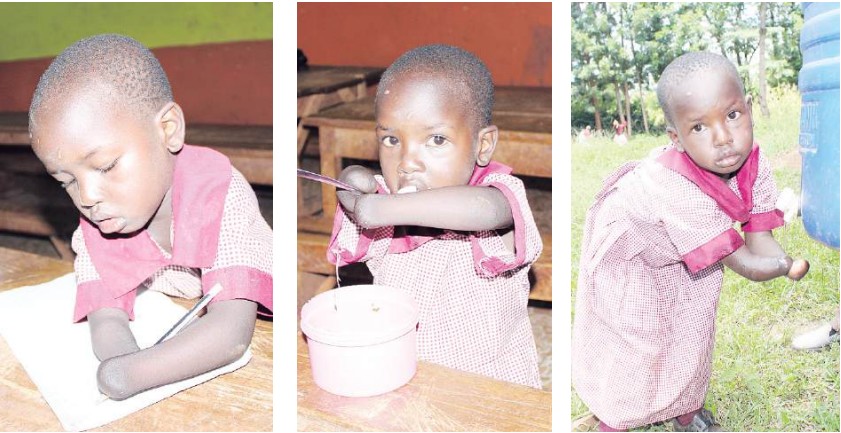

At Kiandangae ECDE centre, Kirinyaga West subcounty, Kirinyaga county, a four-year-old girl plays with her classmates.
The girl, Gladys Micere, was born without hands. Her arm ends at the wrists.
When she was enrolled at the school instead of the special class last year, teachers were surprised she could write despite having no fingers.
Joyce Wangari, the class teacher, said she at first wondered how the child would cope and interact with the children.
“When she was brought here by her grandmother last year, she was underage and we were all very surprised to see her use her elbow to hold a pen and write,” she said.
The girl can also feed herself, both with a spoon and without and use the toilet by herself.
Her confidence and towering esteem further served to allay their doubts and made it easy for her peers to interact with her.
It was lunchtime and Micere took her lunch basket, picked her lunch box and impulsively opened it.
The child, fondly known as Buju after Jamaican reggae artiste Buju Banton, then picked a spoon and went about having her lunch, with her best friend close by as they enjoyed a normal children’s chitchat.
“She is an average performer in a class of 74 pupils, meaning she does better than many of her classmates who don’t face the challenges that she does,” Wangari said, explaining that she helps her with the small things she can’t do such as tying her shoe laces.
Micere’s mother Margaret Wamuria told The Star that she was shocked when the child was born with disability since there’s no one else with the condition in her family.
Wamuria had to leave her matrimonial home in Kinamba, Laikipia county, shortly after giving birth to the child due to domestic violence.
“When I gave birth to her, my mother-in-law said they don’t give birth to disabled children in her family and beat me up with a chunk of firewood just a week later,” she said.
The hostility was so severe that Wamuria decided to make the long trip back to her maternal home despite not having healed from the delivery process.
Her mother, a casual labourer, helped take care of her and the baby.
But the financial challenges and ridicule from neighbours almost drove her to depression and prompted her to start drinking heavily.
“Neighbours would say witchcraft caused my child to be born without hands. I would drink, chew miraa and sometimes, even smoke bhang. Life lost its meaning and I had suicidal thoughts,” she said.
It took a lot of will power to turn her life around for the sake of her daughter who did not seem fazed by comments about her different hands.
The child, Wamuria added, cleans after herself and even helps with household chores just like any other child.
“She’s learning to wash utensils. She holds the soap and utensils washing sponge on her wrists and rubs them together just like we do,” she said.
“I also send her to the shop and she brings the change back. She’s a very bright girl.
“Sometimes, her peers innocently ask me why she doesn’t have palms but I have learnt not to take it so seriously anymore.”
The mother of two however, said the child will not be able to undertake some activities such as farming and appealed for help to get her prosthetic hands to enable her to live a normal life.
The school’s deputy head teacher Susan Munene said the school has 18 pupils, 11 girls and seven boys, with special needs.
But Munene explained that Micere could not be enrolled into the class due to her inability to carryout most activities.
The girl, she added, has been a source of inspiration for not only her classmates but also other pupils in the school due to her confidence.
“She has been able to demonstrate to them that disability is not inability,” the teacher said, adding that the school emphasises integration among all pupils for social inclusion.
“We’re happy that she was enrolled in our school. With prosthetic arms, there’s no height that the girl cannot scale. Her self-esteem is so high. She barely realises her hands are different.”
She challenged parents to ensure they enroll their children with disabilities in schools to give them a chance to learn and interact.
Chrispen Mayuyu, a local upcoming artiste, said he was astonished to see the girl having a meal of ugali and beef during a social event.
“She was feeding herself without a spoon. I was amazed. I befriended her and found out she is from this area and decided to pay her a visit,” he said.
“It breaks my heart when I see her attempting to do some of these things and failing. With prosthetic arms, her quality of life would definitely improve as she grows,” Micere’s mother says.












